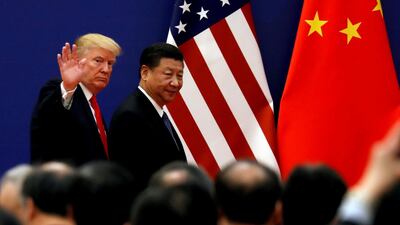Rising trade tensions between the US and China have sparked worries about the 17 exotic-sounding rare earth minerals needed for high-tech products like robotics, drones and electric cars.
China recently raised tariffs to 25 per cent on rare-earth exports to the US and has threatened to halt exports altogether after the Trump administration raised tariffs on Chinese products and blacklisted telecoms giant Huawei.
With names like europium, scandium and ytterbium, most rare earth minerals are extracted from mines in China, where lower wages and lax environmental standards make production cheaper and easier.
But trade experts say no one should panic over China's threats to stop exporting the elements to the US.
There is a US rare minerals mine in California. And Australia, Myanmar, Russia and India are also top producers of the somewhat obscure minerals. Vietnam and Brazil both have huge rare-earth reserves.
"The sky is not falling," said Mary B. Teagarden, a China specialist, professor and associate dean at the Thunderbird School of Global Management in the US. "There are alternatives."
Simon Lester, associate director of the Centre for Trade Policy Studies at the Cato Institute think tank in Washington, agreed. "Over the short term, it could be a big disruption, but companies that want to stay in business will find a way," he said.
Although the US is among the world's top 10 countries for rare-earths production, it is also a major importer of the minerals, using China for 80 per cent of what it buys from other countries, according to the US Geological Survey. Last year China produced about 120,000 metric tonnes of rare earths, while the US produced 15,000 tonnes.
The US also depends on China to separate the minerals pulled from Mountain Pass Mine, the sole rare-earths mine in America, which was bought two years ago by the Chicago-based JHL Capital Group LLC.
"We need to develop a US-based supply chain so there is no possibility we can be threatened," said Ryan S. Corbett, managing director of JHL Capital.
The mine's top products are neodymium and praseodymium, or NdPr, two elements which are used together to make the lightweight magnets that help power electric cars and wind turbines and are found in electronics such as laptop hard drives.
Mountain Pass, located in San Bernardino County, California, was once the top supplier of the world's rare-earth minerals, but China began taking over the market in the 1990s and production at the US mine stopped in 2002.
Mountain Pass later restarted production only to close again amid a 2015 bankruptcy. Corbett said extraction resumed last year after JHL Capital purchased the site with QVT Financial LP of New York, which holds 30 per cent, and Shenghe Resources Holding Co., Ltd. of China, a non-voting shareholder with 9.9 per cent.
Since then, Mountain Pass has focused on achieving greater autonomy with a $1.7 billion (Dh6.24bn) separation system set to go online late next year that would allow it skip sending rare-earths ore to China for that step.
China could hurt itself in the long run by cutting off the US, specialists said.
David Merriman, a rare-earths analyst for Roskill commodity research in London, said that during a similar trade spat with China in 2011, Japan began looking to other countries, including Australia, for the minerals needed to manufacture electronics.
Australian rare-earths production giant Lynas Corp. Ltd. this month announced a proposed deal with Blue Line Corp. of Texas for a separation facility at an industrial site in Hondo, Texas.
There may be other options, too. Deposits of rare earths have been detected in other US states including Wyoming and Alaska, as well in several remote areas of Canada. The Interior Department is calling for more prospecting and mining of "critical minerals," including on public lands currently considered off-limits, and even in oceans.
"We have to be more forward thinking," said Alexander Gysi, an assistant professor in geology and geological engineering at the Colorado School of Mines. "It would be better for the US to have a greater range of sources for rare earths."

